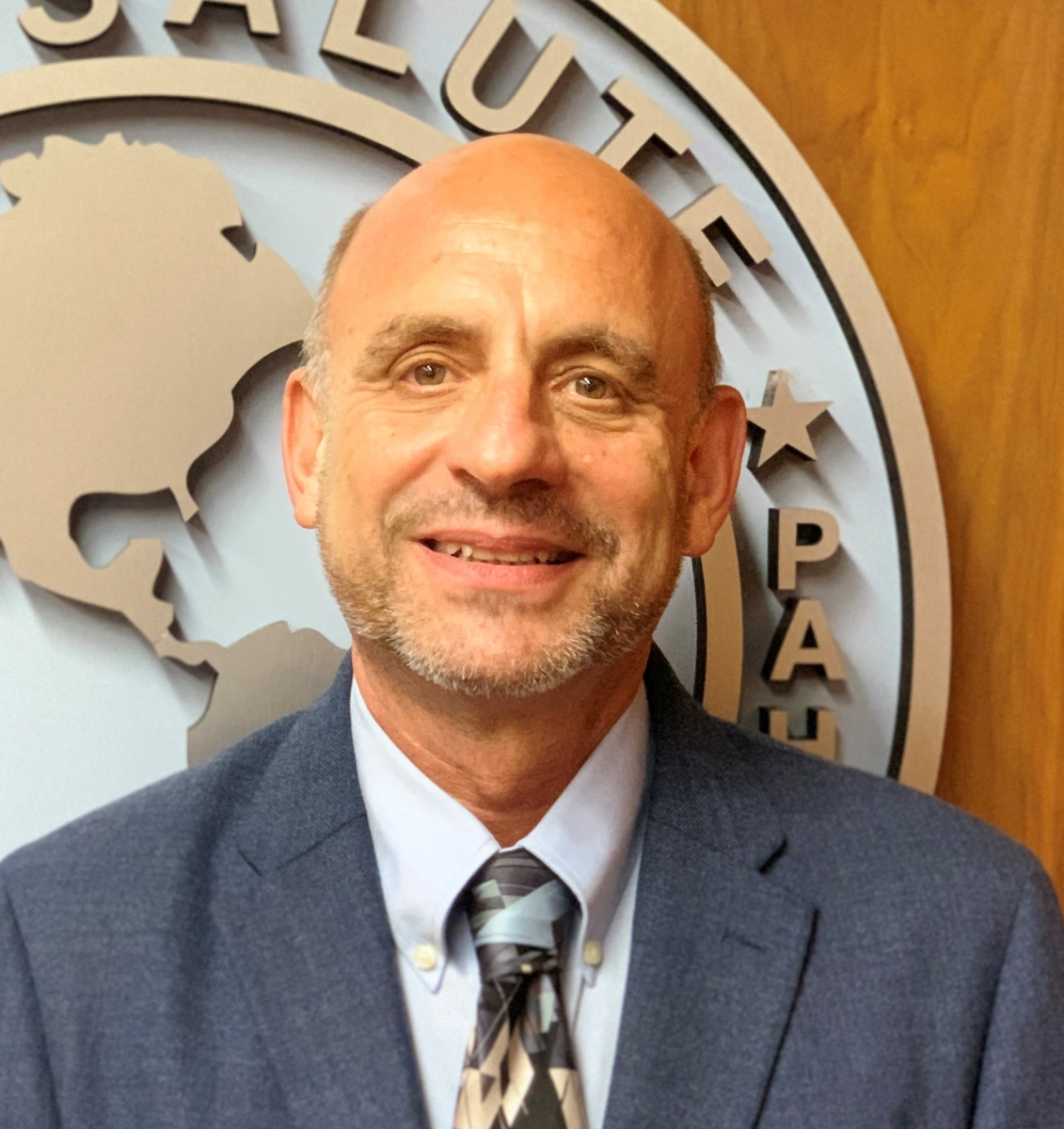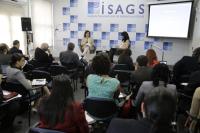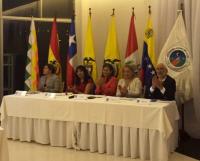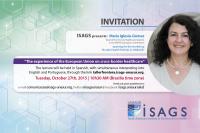Workshop will discuss the new professional profiles and the new attributions of health technicians for the work in PHC
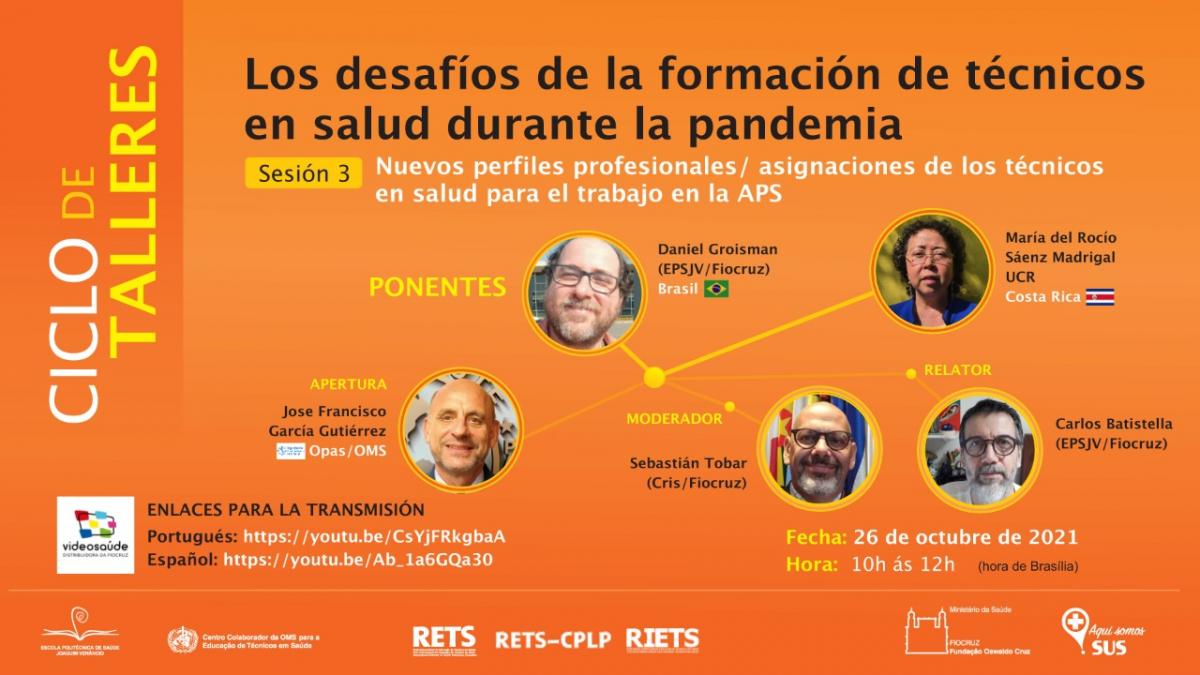
The third session of the Workshop Cycle 'Challenges for the Training of Health Technicians in the Pandemic', to be held on October 26th, from 10 am to 12 pm (Brasilia time), will discuss the new professional profiles/assignments of health technicians to work in PHC. The discussions will be based on the presentation of two experiences in this area. Former Costa Rican Health Minister Maria del Rocio Saenz Madrigal and professor and researcher Daniel Groisman, from EPSJV/Fiocruz, a specialist in the training of workers for the care of the elderly and public policies for aging, will participate as debaters in this workshop. The workshop will be opened by José Francisco García Gutierrez, PAHO/WHO Regional Advisor on Human Resources in Health. Those who wish may request the Certificate of Participation, through the link available in the chat of the event, which will be broadcasted in Portuguese and Spanish.
Link for transmission in Portuguese: https://youtu.be/CsYjFRkgbaA
Link for transmission in Spanish: https://www.youtube.com/watch?v=Ab_1a6GQa30
About the workshop's theme
The work of health technicians, considered strategic for national health systems, requires constant investment in professionalization and continuing education policies, in order to qualify their work with the services and the population. In recent years, new training profiles and attributions of these workers have been required, either because of changes in PHC policies due to the transition in demographic and epidemiological patterns or because of changes in the ways of thinking about health care in contemporary societies.
In addition, the advent of the Covid-19 pandemic required health services to reorganize several work processes. Changes in routines and priority lines of care, care flows, contact surveillance, etc. Still in progress, this reconfiguration indicates the emergence of new roles and responsibilities that have an impact on the training profiles of health technicians. The reinforcement of their role in notification and surveillance actions brings back to national health systems the challenge of facing the historical precariousness of health work, promoting regulatory frameworks for the professionalization of several existing profiles. At the same time, the increasing use of digital technologies and clinical diagnosis to face the pandemic brings new responsibilities and competencies to PHC workers.
The social impact of the pandemic will also be felt in the fragile economies of the continent, representing the presumed increase of malnutrition and obesity, as well as issues related to the mental health of vulnerable populations.
The expansion of Interprofessional Education and the work in multiprofessional teams as well as the issue of Interculturality, with the necessary recognition of diverse popular and ancestral knowledge in health promotion of the populations, are also important factors for changing the existing profiles.
The objective of our third workshop, therefore, is to discuss some important questions in this context, including: To what extent do they affect the training of health technicians in the countries? How quickly are the changes in health care services reflected in the training of these workers? Are there instances in the countries where service managers can work in partnership with training institutions to make this process permanent? What new profiles and attributions of health technicians to work in PHC have emerged in the context of the Covid-19 pandemic? What are the main difficulties faced by National Health Systems to introduce these changes?
About the members of the table
José Francisco García Gutierrez, Regional Advisor on Human Resources for Health at PAHO/WHO. has a degree in Medicine and Surgery from the University of Salamanca-Spain, a specialist in Preventive Medicine and Public Health, a Master in Public Health (MSc), and a Doctorate in Community Medicine (Ph.D.) from the University of Dublin. His main areas of interest are human resource development in health, evidence-based medicine, implementation of good clinical practice, teaching innovation (iLearning), and social use of new technologies (eHealth).
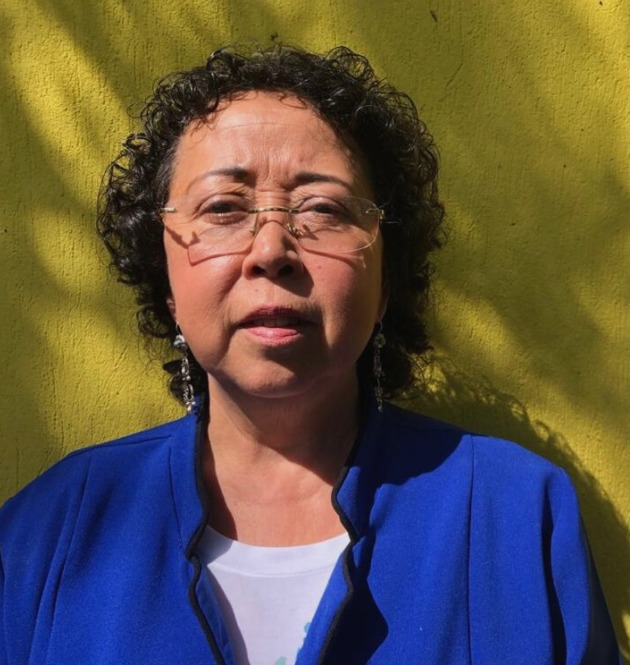 María del Rocío Sáenz Madrigal is a professor and researcher at the University of Costa Rica, where she received her medical degree. Master in Public Health from the University of La Salle in Mexico, she has held numerous public positions, including Minister of Health (2002-2006), and Executive President of the Costa Rican Social Security Fund (2014-2018). An international expert in the field of Public Health, she has been a member of PAHO's Board of Directors, acting, at various times, as a consultant to the organization.
María del Rocío Sáenz Madrigal is a professor and researcher at the University of Costa Rica, where she received her medical degree. Master in Public Health from the University of La Salle in Mexico, she has held numerous public positions, including Minister of Health (2002-2006), and Executive President of the Costa Rican Social Security Fund (2014-2018). An international expert in the field of Public Health, she has been a member of PAHO's Board of Directors, acting, at various times, as a consultant to the organization.
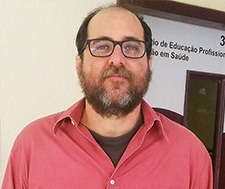 Daniel Groismanis a professor-researcher of the Laboratory of Professional Education in Health Care at the Joaquim Venâncio Polytechnic School of Health (EPSJV/Fiocruz). He holds a degree in Psychology from the Pontifical Catholic University of Rio de Janeiro, a Master's in Collective Health from the State University of Rio de Janeiro, and a Ph.D. in Social Service from the Federal University of Rio de Janeiro. Her main themes are: training workers to care for the elderly and public policies for aging.
Daniel Groismanis a professor-researcher of the Laboratory of Professional Education in Health Care at the Joaquim Venâncio Polytechnic School of Health (EPSJV/Fiocruz). He holds a degree in Psychology from the Pontifical Catholic University of Rio de Janeiro, a Master's in Collective Health from the State University of Rio de Janeiro, and a Ph.D. in Social Service from the Federal University of Rio de Janeiro. Her main themes are: training workers to care for the elderly and public policies for aging.
About the Workshop Cycle
The purpose of the initiative is to generate a space for exchange, reflection, learning, and formulation of proposals based on concrete experiences of how different training institutions have faced these challenges and achieved their goals.
The workshops are being held every 45 or 60 days, in Portuguese and Spanish, with a duration of two hours. The proposal is to present, in each workshop, experiences made by institutions that are part of the Networks, in order to allow the debate and exchange among those present. Based on the themes discussed during the debate, topics of interest for the next workshops are defined.

